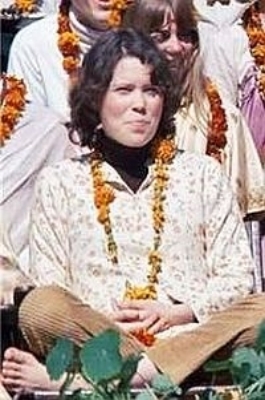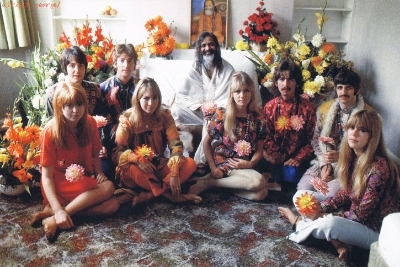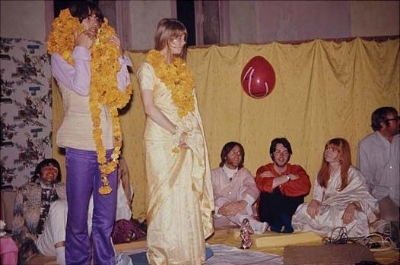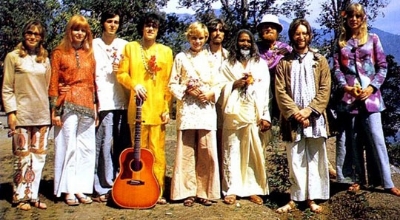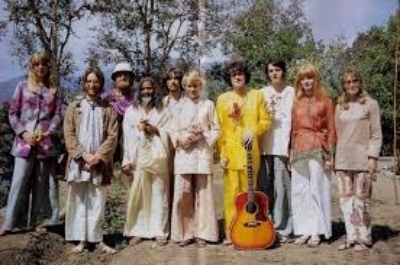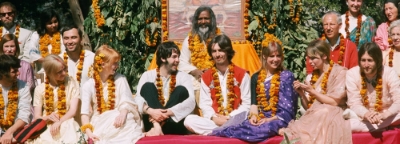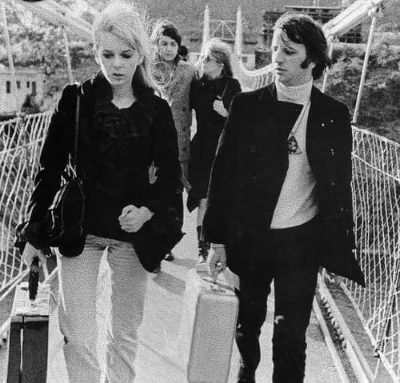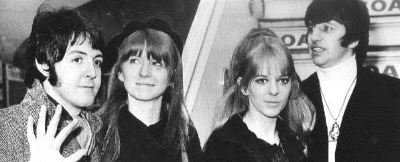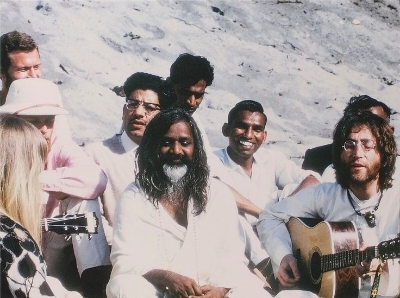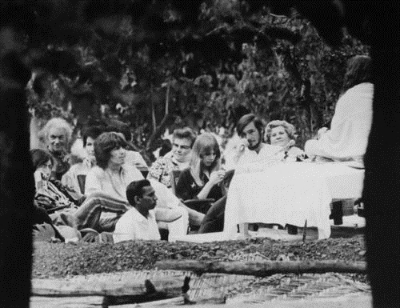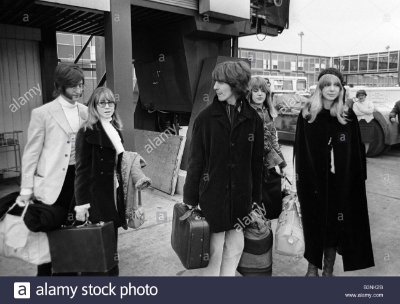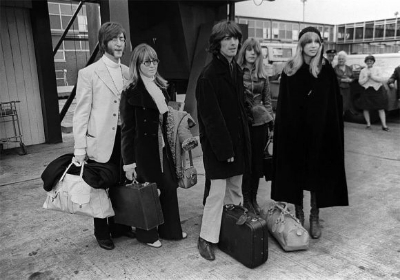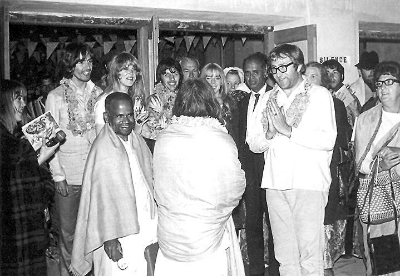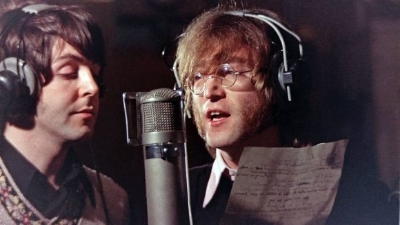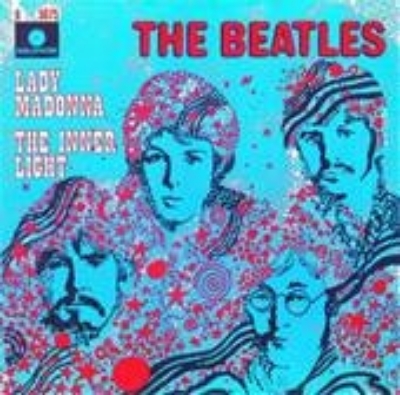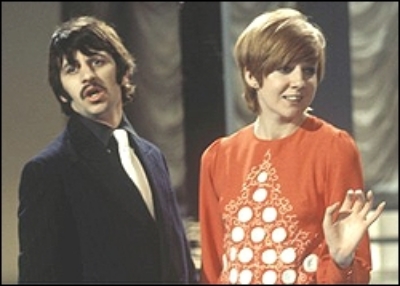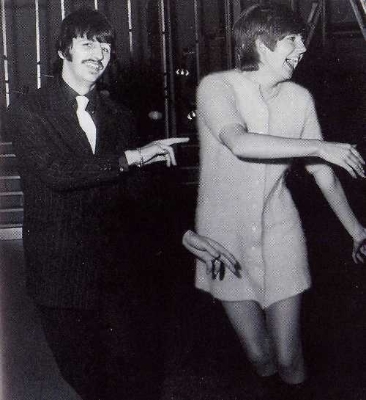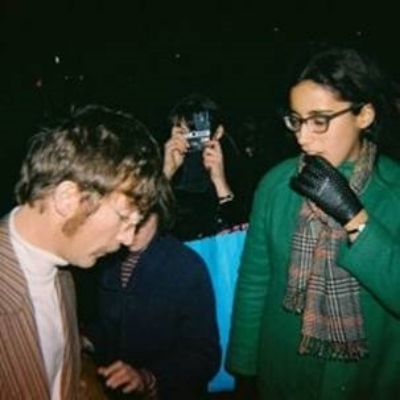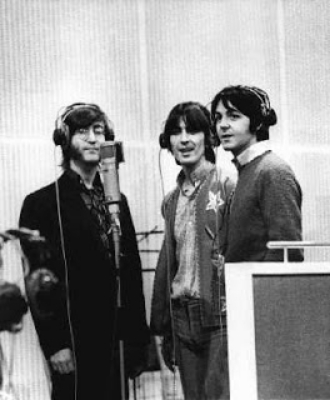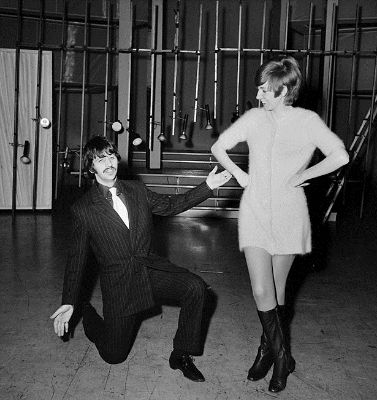The Beatles are still in India.
Fab Four Blog
“Dear Prudence”
“Dear Prudence” is the name of a Beatles song written by John Lennon. It appears on the Beatles’ November 1968 double-disc White Album. Lennon wrote the song earlier that year in India, inspired by a woman named Prudence Farrow, sister of actress Mia Farrow.
The Beatles and the Farrow sisters were part of a larger group who were then visiting the Maharishi Mahesh Yogi on a weeks-long retreat in Rishikesh, India. It was February-March 1968.
Prudence Farrow, then focused on learning transcendental meditation (TM), stayed in her room for long periods of time. Lennon, worried she was depressed, wrote the song “Dear Prudence,” inviting her — as his lyrics would say — to “come out to play.”
“All the people around her were very worried about the girl,” Lennon would later say. “…So, we sang to her.” Lennon and George Harrison were delegated by the group to help bring Prudence out, as she had held up in her room for some time. Farrow was intent on learning the TM technique well enough to be able to teach it herself.
“I would always rush straight back to my room after lectures and meals so I could meditate,” she would later explain. “John, George and Paul would all want to sit around jamming and having a good time and I’d be flying into my room. They were all serious about what they were doing, but they just weren’t as fanatical as me…”
Later, as the Beatles were leaving India, George Harrison mentioned to Prudence that they had written a song about her. Farrow, flattered at the attention, would not hear the song until it came out on the album.
The Beatles time in India was spent in the holy "Valley of the Saints", the International Academy of Meditation, also called the Chaurasi Kutia ashram, was a 14-acre (57,000 m2) compound. It stood across the River Ganges from Rishikesh, the "yoga capital of the world" and home to many ashrams in the foothills of the Himalayas, 150 feet (46 m) above the river and surrounded by jungle. The Maharishi's facility was built in 1963 with a $100,000 gift from American heiress Doris Duke, on land leased from the Uttar Pradesh Forest Department. The training centre was designed to suit Western habits and was described variously as "luxurious" and "seedy".
Starr later compared the ashram to "a kind of spiritual Butlins" (a low-cost British holiday camp). It was built to accommodate several dozen people and each of its stone bungalows contained five rooms. Each was equipped with electric heaters, running water, toilets, and English-style furniture. According to DeHerrera, the Maharishi obtained many "special items" from a nearby village so that the Beatles rooms would have mirrors, wall-to-wall carpeting, wall coverings, "foam mattresses" and bedspreads. She wrote that "by the standard of the other" bungalows, the Beatles' cottages "looked like a palace".
The Maharishi had arranged a simple lifestyle for his guests, which included stone cottages and vegetarian meals taken outdoors in a communal setting. The days were devoted to meditating and attending lectures by the Maharishi, who spoke from a flower-bedecked platform in an auditorium. The Maharishi also gave private lessons to the individual Beatles, nominally due to their late arrival. The tranquil environment provided by the Maharishi – complete with meditation, relaxation, and away from the media throng – helped the band to relax. Harrison told Saltzman, "Like, we're The Beatles after all, aren't we? We have all the money you could ever dream of. We have all the fame you could ever wish for. But, it isn't love. It isn't health. It isn't peace inside, is it?" Lennon was respectful of the Maharishi but not in awe of him. At their first meeting Donovan remembers that the Maharishi was "amiable but non-talkative", and during an awkward silence Lennon walked across the room and patted the Maharishi on the head, saying, "There's a good little guru" while the room erupted in laughter. Maharishi cancelled the formal lectures for a time and told students to meditate for as long as possible. One student meditated for 42 straight hours, and Pattie Boyd once meditated for seven hours. Boyd's sister Jenny meditated for long periods as well, but also suffered from dysentery (misdiagnosed as tonsilitis); she said Lennon also felt unwell, suffering from jet lag and insomnia. The lengthy meditation sessions left many students moody and oversensitive. Like the 60 other students at the ashram, the Beatles adopted native dress and the ashram had a tailor on the premises to make clothes for the students. The Beatles shopped in Rishikesh and the women bought saris for themselves and to be made into shirts and jackets for the men, which affected Western fashion when the Beatles wore them after going home.
George's birthday in Rishikesh
In February 1968, the Beatles travelled to Rishikesh in northern India to attend an advanced Transcendental Meditation (TM) training session at the ashram of Maharishi Mahesh Yogi. John with Cynthia, George with Pattie and Jenny Boyd arrived on 15 February. Paul with Jane Asher, Ringo and Maureen arrived four days later.
A few days after their arrival was George’s birthday and they had a party.
The Maharishi celebrated George’s 25th birthday and Harrison played sitar. He gave Harrison an upside-down plastic globe of the world and said: “George, the globe I am giving you symbolizes the world today. I hope you will help us all in the task of putting it right.” Harrison immediately turned the globe to its correct position, shouting, “I’ve done it!”
The Beatles are in India
The Beatles in India
Among others in a group attending the retreat in India around that same time were: American actress Mia Farrow (soon to be divorced from Frank Sinatra); Mia’s sister, Prudence Farrow; Mia’s brother John; Paul Horn, jazz flautist; Lewis H. Lapham, journalist, Paul Saltzman, film-maker (and later, author of The Beatles in Rishikesh), Scottish singer-songwriter Donovan of “Sunshine Superman” fame (1966); American actress Candice Bergen; Mick Jagger of the Rolling Stones; British singer Marianne Faithfull; Mike Love and Al Jardine of the Beach Boys; John Densmore and Ray Manzarek of The Doors; and Patti Harrison, Jane Asher, and a number of others.
The gathering in India, with all its high-powered celebrity, attracted a press following and a share of newspaper and magazine stories, a number of which appeared in the U.S., the U.K., and elsewhere. The Saturday Evening Post, for example, ran a featured cover story on the trip in its May 4th, 1968 edition, having sent a reporter to go with Beatles to Rishikesh. “Here’s the Scene:,” began the headline on the Post’s cover story. “The Beatles, Mia Farrow and a Post Reporter All Gather in India to Meditate with The Maharishi Mahesh Yogi.” This was actually a two-part story, with the conclusion running in the Post’s May 18th edition.

The Beatles are still in India today
Soon after the Beatles' arrival, the Maharishi arranged for a group photo of all the students. In Lapham's description, the Maharishi began preparing for the shot early one morning and approached the task as if "the director on a movie set". Instructing his assistants, he oversaw the assembly of a platform of risers, the precise placement of flowers and potted plants in front of the raised stage, and the seating allocation for each of the students from his hand-drawn diagram. The students were then called down to take their allocated seat, surrounding the Maharishi; each member was dressed in traditional Indian attire and adorned with a marigold garland of red and orange. The Maharishi had a large picture of Swami Brahmananda Saraswati – the guru evoked by Lennon in "Across the Universe" – placed behind him.
The photo took half an hour to complete while the participants sat facing the bright morning sun. In 2009, The Hindu described the result as "one of the most iconic photographs in the history of rock 'n' roll". For the Beatles' public image, their attire contrasted with the modern, psychedelic clothing they had worn on arrival from London. The photo and others from the shoot were used in Lapham's cover article for The Saturday Evening Post, a magazine that, although in decline by 1968, was influential among America's suburban middle class. Saltzman, a Canadian filmmaker who was visiting the ashram after completing film work elsewhere in India, was one of the photographers at the session. His shots from this time were compiled in his book The Beatles in Rishikesh, published in 2000.
Paul McCartney and Ringo Starr arrive in Rishikesh, India
The arrival of Paul McCartney and Ringo Starr in Delhi was quite different from the journey taken by John Lennon and George Harrison a few days earlier.
The world's press was now aware of The Beatles' presence in India, and cameramen and reporters were on hand as they disembarked. The flight from London had lasted 20 hours, and the group was understandably exhausted upon their arrival.
They were met in Delhi by their assistant Mal Evans, and Raghvendra from Maharishi Mahesh Yogi's ashram in Rishikesh. Garlands of red and yellow flowers were placed around the visitors' necks.
Starr was suffering pain in his arm following inoculation injections, and the party set off for a hospital. Their driver, however, lost his way and drove down a dead end in a field, along with the press convoy. One local reporter eventually led them to the hospital.
Afterwards they began the 150-mile journey to Rishikesh. The Academy of Transcendental Meditation was situated 150 feet above the Ganges, and was surrounded by mountainous jungles.
There was an Indian driver and Raghvendra from the camp in front and me and Jane Asher in the back and it was long and it was dusty and it was not a very good car and it was one of those journeys, but great and exciting. I remember these Indian guys talking in what was obviously an Indian language and I was starting to doze off in the car in the back because once you were two hours into the journey the tourism had worn off a little. It was fascinating seeing naked holy men and the kind of thing you just don't see unless it's late-night Soho, and the ones you tend to see in Soho tend to be covered in shit and very drunk. I slipped into sleep, a fitful back-of-the-car sort of sleep. It was quite bumpy, and the guys were chattering away, but in my twilight zone of sleeping it sounded like they were talking Liverpool. If you listened closely, it so nearly slid into it. There was like a little segue into very fast colloquial Liverpool. And I was thinking, Uh, where the fuck am I? What? Oh, it's Bengali, and I would just drop off again. 'Yabba yabba, are yer comin' oot then, lad?' It was a strange little twilight experience. It was a long journey. (Paul McCartney)
Paul McCartney and Ringo Starr fly to India
Paul McCartney, his partner Jane Asher, plus Ringo Starr and his wife Maureen, flew from London Airport on this day. They were bound for Delhi, India, where John Lennon and George Harrison had arrived three days earlier.
On the flight over, we, Paul and I, decided to go the whole way, and become vegetarians. I shall still eat eggs, but that's it. That's about all in that line. I suppose it would be better to call us 'fruit-atarians' than anything else. We all think it is a lot healthier than eating meat, anyway. (Ringo Starr)
The 20-hour flight lasted through the night, and they touched down in Delhi early on 20 February.
Usually, I tell people I want to get somewhere quietly, and it turns out that everyone knows. A hundred people are in on the secret. I know what it is; the airline likes to get you photographed with the name. This time, we just drove into Delhi, got a ticket, and that was it. We stopped off in Tehran and this blog from the airline came up and said, 'Excuse me, are you one of The Beatles?' So I said, 'No,' and he just walked away and that was that. I guess we're not too big in Tehran. (Ringo Starr)
The Beatles arrived in India in February 1968, along with their wives, girlfriends, assistants, and numerous reporters. They joined a group of 60 people who were training to be TM teachers, including musicians Donovan, Mike Love and Paul Horn, and actress Mia Farrow. While there, John Lennon, Paul McCartney and Harrison wrote many songs, and Ringo Starr finished writing his first. Eighteen of those songs were recorded for The Beatles ("the White Album"), two songs appeared on the Abbey Road album, and others were used for various solo projects.
The Beatles visiting India…
The Beatles travelled to India to stay and study Transcendental Meditation at the ashram of Maharishi Mahesh Yogi in Rishikesh. In its effect on Western spirituality, this was probably ‘the most momentous spiritual retreat since Jesus spent those forty days in the wilderness.’
John Lennon and George Harrison arrive in Rishikesh
John and Cynthia Lennon, and George and Pattie Harrison arrived in Delhi at 8.15am, having flown overnight from London Airport.
They were met in Delhi by The Beatles' assistant Mal Evans, who had arrived there on 14 February, and Mia Farrow.
Evans had organised three taxis to take the group from Delhi to Rishikesh, where they were to study meditation with Maharishi Mahesh Yogi. It was a journey of some 150 miles.
Our arrival at Delhi went very much unheralded. We were bundled unmolested and travel-weary into three battered, ancient Indian taxis without all the usual fuss and frantic rush. It was wonderfully refreshing and stress free. After alighting from the taxis, we were shown to our living quarters. They consisted of a number of stone-built bungalows, set in groups along a rough road. Flowers and shrubs surrounded them and were carefully tended by an Indian gardener whose work speed was dead slow, and stop. (Cynthia Lennon)
John Lennon and George Harrison fly to India
The Beatles' long-planned trip to India finally got underway on this day, with John Lennon and George Harrison, plus their wives Cynthia and Pattie, and Pattie's sister Jenny, flying from London Airport to Delhi, India.
The trip had been due to take place in the summer of 1967, but was postponed following the death of Brian Epstein. The Beatles had chosen instead to press on with the making of Magical Mystery Tour.
The Indian excursion was to study Transcendental Meditation with Maharishi Mahesh Yogi at his ashram in Rishikesh, where they stayed until 12 April.
Source: Beatles Bible
Mal Evans flies to India
The Beatles' assistant Mal Evans gathered together luggage belonging to George and Pattie Harrison, her sister Jenny, plus John and Cynthia Lennon, to take it to India ahead of their trip to study Transcendental Meditation with Maharishi Mahesh Yogi.
Evans took Qantas flight 754 to Delhi, flying from London Airport. There was a charge of £195.19.6d for the excess baggage, a considerable sum in 1968.
His early flight was in order to arrange the necessary transport for the group when they arrived early on 16 February.
The Beatles in-between recording.
The Beatles in-between recording.
Recording, mixing: Hey Bulldog
Just days before they were due to fly to India to study meditation with Maharishi Mahesh Yogi, The Beatles recorded Hey Bulldog, a brand new John Lennon song, during the filming of a promotional clip for Lady Madonna.
The group gathered in Abbey Road's Studio Three at 4pm to be filmed by NEMS employee Tony Bramwell. While there, The Beatles decided to put their time to good use, and recorded the new song.
On February 11, they recorded Hey Bulldog at Abbey Road, while I filmed the entire process. We didn't need any promo material for Bulldog, but Paul had also recorded Lady Madonna, the song he had written in memory of his mother, which did need some promotional film. I cut the Bulldog shoot, using the bits of the lads playing and sitting about in the studio, and we used that. Then it vanished, completely disappeared. We thought it had been stolen, as things often were if not nailed down. (Over thirty years later, in August 1999, my original film was rediscovered and used with a reissue of Bulldog to go with the revamped digital version of Yellow Submarine.)
Tony Bramwell
Magical Mystery Tours
In fact, three separate clips were edited from the footage, and variously included effects such as filters, double exposures, and extra material filmed at the session for Cilla Black's song Step Inside Love, written by Paul McCartney and recorded in November 1967.
The most common Lady Madonna clip begins with an overhead shot of Ringo Starr on drums, and ends with footage of McCartney from the Step Inside Love session, picking up his coat and guitar and leaving the studio. A lesser-seen variation begins with Starr in a coat and tie and features George Harrison eating a plate of beans.
A third version was created for Anthology in the 1990s, combining elements from both clips plus footage from the 30 July 1968 session for Hey Jude.
Hey Bulldog was recorded in 10 takes, with Lennon on piano, McCartney shaking a tambourine, Harrison on rhythm guitar and Starr on drums. McCartney then overdubbed a bass guitar part onto track two of take 10, accompanied by Harrison playing the main riff on a distorted guitar and additional off-beat snare drum from Starr.
Lennon and McCartney then shared a single microphone to record the vocals, reading from Lennon's handwritten lyrics. This included banter and howling during the song's ending.
I remember Hey Bulldog as being one of John's songs and I helped him finish it off in the studio, but it's mainly his vibe. There's a little rap at the end between John and I, we went into a crazy little thing at the end.
Paul McCartney
Many Years From Now, Barry Miles
After Bramwell had finished filming, final overdubs were added. These included the lead guitar solo, performed on George Harrison's Gibson SG Standard, although the identity of the player is uncertain.
Once recording was complete, two mono mixes of Hey Bulldog were made. The second of these was then given to King Features, who made an animated sequence for the Yellow Submarine film to accompany the song.
The mixes were made with the tape machine running slightly faster - 51 cycles per second rather than the usual 50 - which raised the pitch and tempo of the song slightly. Artificial double tracking (ADT) was also used.
That was a really fun song. We were all into sound texture in those days and during the mixing we put ADT on one of the 'What did he say? Woof woof' bits near the end of the song. It came out really well.
Source: Geoff Emerick - The Complete Beatles Recording Sessions, Mark Lewisohn
The Beatles are in-between recording.
The Beatles took a short break.
Recording, mixing: The Inner Light, Across The Universe
Studio Two, EMI Studios, Abbey Road
Producer: George Martin
Engineers: Geoff Emerick, Ken Scott
There were two scheduled recording sessions on this day. The first took place from 2.30-9pm and saw the completion of The Inner Light and further work on Across The Universe, while the second was a mixing session from 10pm to 12.15am.
The Inner Light was the first to be completed. George Harrison double-tracked his vocals for the final "arrive without traveling" line, and was joined by John Lennon and Paul McCartney on "do all without doing". Three mono mixes, numbered 2-4, were then created and work on the song was complete.
The Beatles then turned their attentions to Lennon's song Across The Universe. A track containing backwards bass and drums was erased and replaced with wordless three-part harmonies from Lennon, McCartney and Harrison. An organ part by George Martin and Mellotron by Lennon were also taped and discarded, and the final overdub was electric guitar played through a volume pedal, plus maracas and piano.
Comedian Spike Milligan was present at the session; he and Ringo Starr had appeared in an edition of Cilla Black's television show Cilla two days previously on 6 February 1968. Since Lady Madonna and The Inner Light had both been selected for The Beatles' next single, Milligan asked if it could be used for a charity album to benefit the World Wildlife Fund.
Two mono mixes created on this night were never issued, but they did include the wildlife effects that can be heard on the Past Masters collection.
The effects were most likely added on this day, and were taken from the Abbey Road library; they included the sounds of children playing and birds twittering and flying. One of this day's mixes was played by The Beatles at the end of the 7 January 1969 Get Back/Let It Be session, to remind themselves of the song's structure.
The World Wildlife Fund album was eventually released on 12 December 1969 as No One's Gonna Change Our World, with Across The Universe as the opening song. The mix which was used was created on 2 October that year.
The Beatles in-between recordings
Ringo Starr appears on Cilla Black’s television show
Ringo Starr was not present for The Beatles' recording sessions on this day, as he was at the BBC's Television Theatre in London to rehearse and record an appearance on Cilla Black's television show Cilla.
This was the second edition of Cilla, a variety show with a number of guests each week. Rehearsals took place on this day from 10.30am-1pm, and 2-6.30pm, and the 50-minute show was broadcast live from 8pm. The guests were comedian Spike Milligan and ventriloquist Peter Brough.
Starr appeared during the opening credits and in a number of skits. In the first, he assisted Black in sorting through her fan mail and introduced one of her singing performances, I'm Playing Second Fiddle To A Football Team. A second sketch saw him interact with Peter Brough and performing with his own 'dummy', introduced as Ariadne but actually Black in a school uniform.
Starr and Black duetted unaccompanied on the 1905 song Nellie Dean while he drank from a pint of beer, and finally they sang and danced to a 1917 song entitled Do You Like Me?
The Beatles' two sessions on this day were scheduled to allow an hour's break in between, and it is likely that they watched their bandmate's televised appearance.
Source: Beatles Bible
Television Theatre, London
This was the final day of rehearsals, and took place at the BBC's Television Theatre on Shepherd's Bush Green in west London. Unlike the previous week's, these rehearsals took place on camera.
The day was divided into two sections, which lasted from 1.30-5.30pm and 6.30-10pm. The live show was broadcast the following evening from 8pm.
Starr's appearance was for the second edition of Cilla, a variety show with a number of guests each week. On this occasion they were comedian Spike Milligan and ventriloquist Peter Brough.
Starr appeared during the opening credits and in a number of skits. In the first, he assisted Black in sorting through her fan mail and introduced one of her singing performances, I'm Playing Second Fiddle To A Football Team. A second sketch saw him interact with Peter Brough and performing with his own 'dummy', introduced as Ariadne but actually Black in a school uniform.
Starr and Black duetted unaccompanied on the 1905 song Nellie Dean while he drank from a pint of beer, and finally they sang and danced to a 1917 song entitled Do You Like Me?
Studio Three, EMI Studios, London
John's offering for the new single was the philosophical "Across the Universe", begun this day and completed on the 8th. Six takes were recorded (there was no take three so these were numbered one to seven) with John considering himself best pleased with take seven - the Beatles began an 8:00 pm to 2:00 am session over-dubbing on to this.
But after John had taped his vocal contribution, recorded with the machine running slow to play back fast, he and Paul realized that the song lacked falsetto harmonies. Finding two female singers on a Sunday evening without prior arrangement would usually have been impossible, but for the Beatles all they had to do was step outside the front of EMI Studios and invite inside two of the many fans who congregated there whenever the Beatles were recording. Paul did just this, selecting Lizzie Bravo, a 16 year old from Brazil temporarily living close to Abbey Road, and Gayleen Pease, 17, a Londoner, who were naturally thrilled at being the only fans ever invited to contribute to a Beatles recording.
Once the girl's had taped their "Nothing's gonna change our world" high harmonies they left the studio so that the Beatles could record more overdubs. These included three unusual effects: the first was "Hums Wild"- a 15 second take of humming, recorded and overdubbed three more times to fill the four-track tape, the second was a guitar piece, the third a harp-like sound, the tape box denoting that these latter two were "to be played backwards". At least two of these, "Hums Wild" and the guitar played backwards, were temporarily inserted into "Across the Universe" long enough for John to make a 7 1/2 ips copy for taking home.
Source: The Complete Beatles Chronicle
Studio Three - EMI Studios
The Beatles visit to India to study under Maharishi Mahesh Yogi was imminent, John and George flying out on February 15th, Paul and Ringo four days later. As they weren't due to return until late April, they decided to record a new single for release in absentia in Mid-March. As it happened, this concentrated series of sessions, ending on February 11th, was more productive than expected and realized four new songs, all mixed and ready for issue.
The first of these was Paul's "Lady Madonna". Three piano drum takes were recorded the Beatles overdubbed bass, fuzz guitars, drums and lead and backing vocals.
Television Rehearsal Rooms, London
While Ringo was engaged in more daytime rehearsals for Cilla, George Martin was working at Abbey Road making a copy of the "Only A Northern Song" vocal track, presumably to aid his incidental soundtrack contribution to Yellow Submarine, now approaching completion.
This day's copy of Harrison's vocals was most likely to help in the construction of certain sections in the score.
None of The Beatles were present for this session, which took place from 12.00-1pm in the control room of Abbey Road's Studio Two.

Television Rehearsal Rooms, Victoria Rd. North Acton, London
Off camera daytime rehearsals for Ringo at the BBC's specially designated premises in North Acton, West London, running through with Cilla Black his guest appearance in her TV series, set for live broadcast the following Tuesday evening.
On this last day of the month, the Beatles took a break.
In UK Hello Goodbye by The Beatles was in the top 5 hits.
- 1970
- 1969
- 1968
- 1967
- 1966
- 1965
- 1964
- 1963
- 1962

